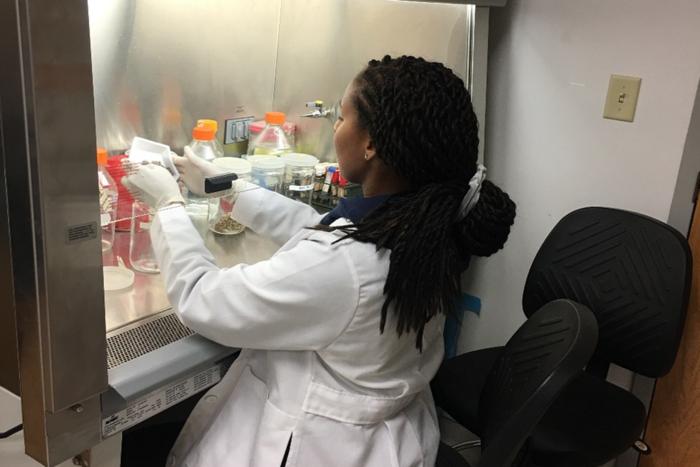In addition to being one of the largest, most diverse metropolitan areas in the world with a population of 6.1 million, South Florida hosts more than 9.7 million acres of farmland with a revenue of more than $7 billion in recent years. However, climate change, extreme weather events, poor soils, pests and disease, and workforce shortages present unique challenges in this region.

Credit: Florida Atlantic University
In addition to being one of the largest, most diverse metropolitan areas in the world with a population of 6.1 million, South Florida hosts more than 9.7 million acres of farmland with a revenue of more than $7 billion in recent years. However, climate change, extreme weather events, poor soils, pests and disease, and workforce shortages present unique challenges in this region.
To address a critical need to train a diverse workforce with new sets of tools and skills to confront these emerging challenges, Florida Atlantic University, in collaboration with Florida International University, has received a four-year, $1 million grant from the United States Department of Agriculture’s (USDA) National Institute of Food and Agriculture (NIFA) to establish South Florida’s first-of-its-kind FAU Microbiome Innovation Center.
The program, “Building Capacity in Microbiome Innovation for Plant Health, Soil Fertility and Environmental Sustainability,” is the first workforce-development USDA-NIFA grant to a research-intensive Hispanic-Serving Institution, which will help address the complex challenges facing traditional agriculture and declining interest of the next generation in food, agriculture and natural resources careers.
“Growing challenges of food safety, biosecurity and agricultural productivity, or emergence of new pathogens such as citrus greening devastation, plant invasion, climate change and depletion of soil fertility, all have a microbiome undertone that needs to be promptly addressed by training competent cross-disciplinary professionals,” said Nwadiuto Esiobu, Ph.D., project director, a professor of biological sciences, and director of the Esiobu Microbial Biotech Laboratory within FAU’s Charles E. Schmidt College of Science. “In virtually every field of science, microbiomes are emerging as key priority themes.”
The FAU Microbiome Innovation Center will develop a new curriculum in wholistic plant health and embark upon creating a culture collection of indigenous beneficial bacteria whose many applications are at the nexus of environmental, agricultural and public health. The project will integrate soft skill development, stipends, and multi-tiered mentoring with experiential learning in cutting-edge microbiomes research.
The center will engage underrepresented undergraduate and graduate students from FAU and FIU and develop an innovative curriculum that will include plant microbiomes, plant biotechnology, microbial ecology and soil microbiology. The grant will procure a bench top DNA sequencer to drive development of a curated collection of indigenous beneficial microbes from South Florida. FAU and FIU undergraduate and graduate students will participate in isolating, sequencing and curating their strains as part of the research experiential programs. The collection will become a valuable asset in customizing probiotics for specific plants in specific ecologies such as wetland grasses, which are experiencing salinity and flooding stress. Currently, there is no such collection in the region.
Experiential learning activities will include novel advanced knowledge in genomics, microbial interactions, ecology, soil fertility, plant bioengineering and sequencing technologies. In addition, the project team will develop mini-pathways, fieldtrips, workshops, summer camps and additional specialized trainings.
The project team includes Krish Jayachandran, Ph.D., co-director and Distinguished University Professor and co-director of the agroecology program in FIU’s College of Arts, Sciences and Education; Evelyn Marques Frazier, Ph.D., university instructor; and Xing-Hai Zhang, Ph.D., a professor, both in the Department of Biological Sciences within FAU’s Charles E. Schmidt College of Science; and Kateel G. Shetty, Ph.D., a research assistant professor in FIU’s College of Arts, Sciences and Education.
The team’s combined expertise includes microbiology and microbial physiology, plant microbe interactions, biotechnology, genomics, environmental and public health, plant pests and ecology, animal health, soil fertility, and plant production with intersecting research interests in emerging fields of synthetic microbiome communities and defense against pathogens and abiotic stress.
The FAU Microbiome Innovation Center will partner with various entities including the Farm Credit Council, several USDA agencies and FAU’s Office of Undergraduate Research and Inquiry. The integrative and collaborative nature of the program fosters an ideal space for inquiry and discovery, facilitating the convergence of different perspectives that invariably promotes understanding and learning.
“The establishment of the FAU Microbiome Innovation Center will significantly enhance teaching and learning at both of our institutions,” said Valery Forbes, Ph.D., dean, FAU Charles E. Schmidt College of Science. “Students will experience firsthand applications of emerging technologies working in faculty mentors’ labs, at internship visits with our partners and shadowing USDA programs and conferences. All of these activities will be focused on problem-solving, developing critical thinking skills, and preparing students for careers in the food, agriculture and natural resources fields.”
– FAU –
About Florida Atlantic University:
Florida Atlantic University, established in 1961, officially opened its doors in 1964 as the fifth public university in Florida. Today, the University serves more than 30,000 undergraduate and graduate students across six campuses located along the southeast Florida coast. In recent years, the University has doubled its research expenditures and outpaced its peers in student achievement rates. Through the coexistence of access and excellence, FAU embodies an innovative model where traditional achievement gaps vanish. FAU is designated a Hispanic-serving institution, ranked as a top public university by U.S. News & World Report and a High Research Activity institution by the Carnegie Foundation for the Advancement of Teaching. For more information, visit www.fau.edu.




